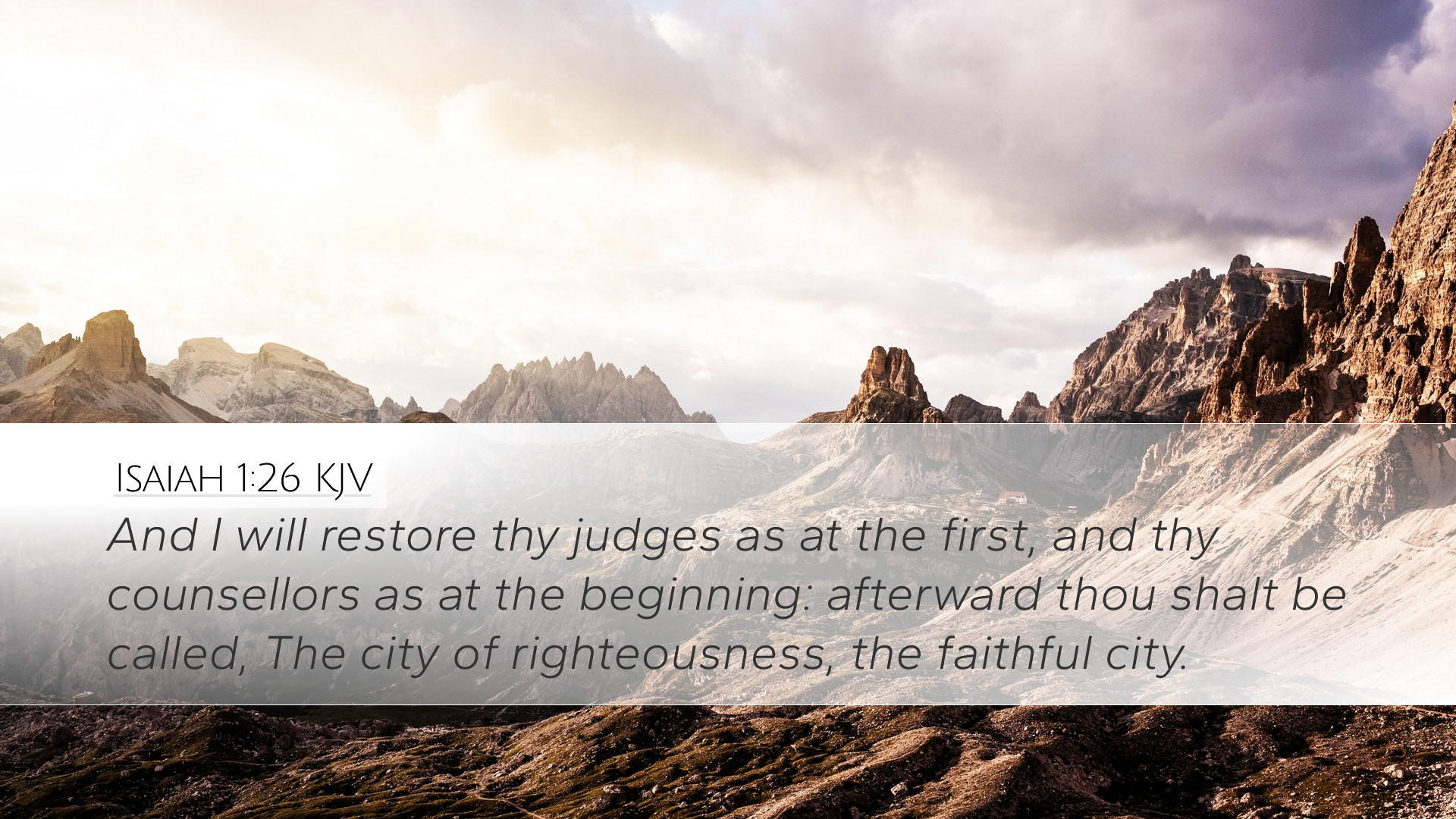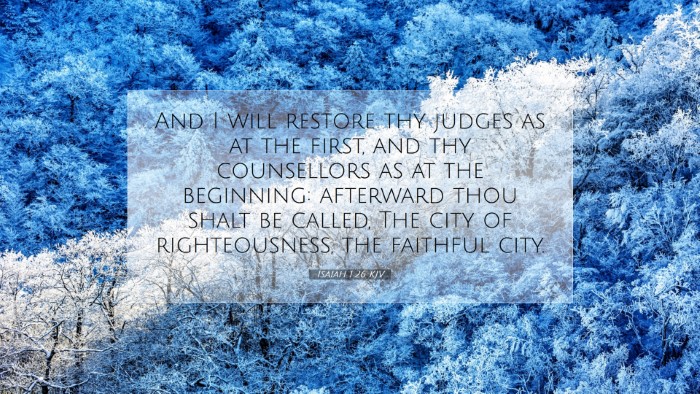Commentary on Isaiah 1:26
Bible Verse: "And I will restore thy judges as at the first, and thy counselors as at the beginning: afterward thou shalt be called, The city of righteousness, the faithful city, the holy city, the Zion of the holy one of Israel." (Isaiah 1:26)
Introduction
The prophetic book of Isaiah provides profound insights into the nature of God's judgment and mercy. Isaiah 1:26 serves as a pivotal verse, highlighting the promise of restoration amidst a backdrop of judgment. This commentary integrates thoughts from renowned public domain commentaries to provide a rich understanding of the implications of this verse for contemporary readers.
The Context of Isaiah
The Book of Isaiah is situated in a tumultuous period of Israel's history. It reflects the moral and spiritual decline of Judah and the impending judgment from God. Matthew Henry notes that the prophet speaks not only of the present condition of Jerusalem but also offers hope for future restoration.
Albert Barnes emphasizes that the leaders of Judah had failed in their duties, leading the nation into corruption and idolatry. The call for restoration implies a return to righteous governance, which is essential for the prosperity and integrity of the community.
Restoration of Judges and Counselors
“And I will restore thy judges as at the first”
This phrase indicates a longing for a return to justice and righteous leadership. Adam Clarke explains that the term “judges” refers not only to legal adjudicators but also to spiritual leaders. The original judges, under Moses, were divinely appointed to lead Israel with integrity and wisdom.
Matthew Henry highlights that the restoration signifies a transformative return to God’s original order, affirming that God’s governance is essential for the well-being of His people. It underscores the principle that true restoration begins with leadership aligned with divine righteousness.
The Role of Counselors
Following the restoration of judges, the mention of “counselors” expands the vision of governance. According to Barnes, counselors are essential for providing wise and godly advice to the leaders of the land. Their role in guiding political and spiritual matters is critical, and their restoration symbolizes a comprehensive renewal in the administration of justice and equity.
The Nature of Righteousness
“Afterward thou shalt be called, The city of righteousness”
The transformation promised in this verse proclaims that Jerusalem, once marked by its failings and compromises, would again become known as a city characterized by righteousness. Henry interprets this as a profound shift from sin to holiness, reflecting a community that embodies God’s truth.
Clarke provides a vital insight that such a title is not merely about moral reformation but indicates a relational transformation between God and His people. It signifies that righteousness is not only a characteristic of the city's operations but also of its inhabitants' hearts.
The Faithful and Holy City
Further descriptors, “the faithful city, the holy city,” extend the implications of this righteousness. Barnes explains that these attributes identify a community that is not only just but also loyal to God. Faithfulness encompasses both loyalty in worship and adherence to divine commands.
Understanding the concept of holiness, Henry points out that a holy city reflects an environment where God’s presence dwells among His people, fostering an atmosphere of reverence and awe toward God. This holistic view emphasizes that true transformation in a city comes from the people’s devotion to the Lord.
Significance of Zion
The verse concludes with the affirmation, “the Zion of the holy one of Israel.” Zion is emblematic of God’s chosen dwelling place and serves as a profound theological insight. Clarke notes that Zion symbolizes the people of God and their covenant relationship with Him. It is not merely a geographic location but a spiritual reality where God’s presence and promise are realized.
This theological framework urges readers to recognize their identity in Christ, the ultimate fulfillment of the promise of Zion. This emphasizes continuity between the Old and New Testament promises where God continues to build His people as a holy nation.
Contemporary Implications
The insights garnered from Isaiah 1:26 speak powerfully to contemporary society. The themes of restoration, righteous leadership, faithfulness, and holiness provide a blueprint for communities today:
- Leadership: There is a pressing need for leaders in spiritual and political arenas to lead with integrity and justice.
- Community Transformation: The call for a city of righteousness challenges believers to advocate for justice, equity, and faithfulness in their local context.
- The Role of the Church: Just as Jerusalem was called to be a beacon of hope, the church today holds the responsibility to embody and proclaim these virtues.
Conclusion
In summary, Isaiah 1:26 encapsulates profound themes of divine restoration and the role of righteous leadership in society. Through the lens of public domain commentaries, we see a rich tapestry woven of hope, challenge, and divine promise. As Israel was called to return to God, so too, are we called to engage in the ongoing work of transformation in our communities, expressing the righteousness and faithfulness of God in every facet of life.


